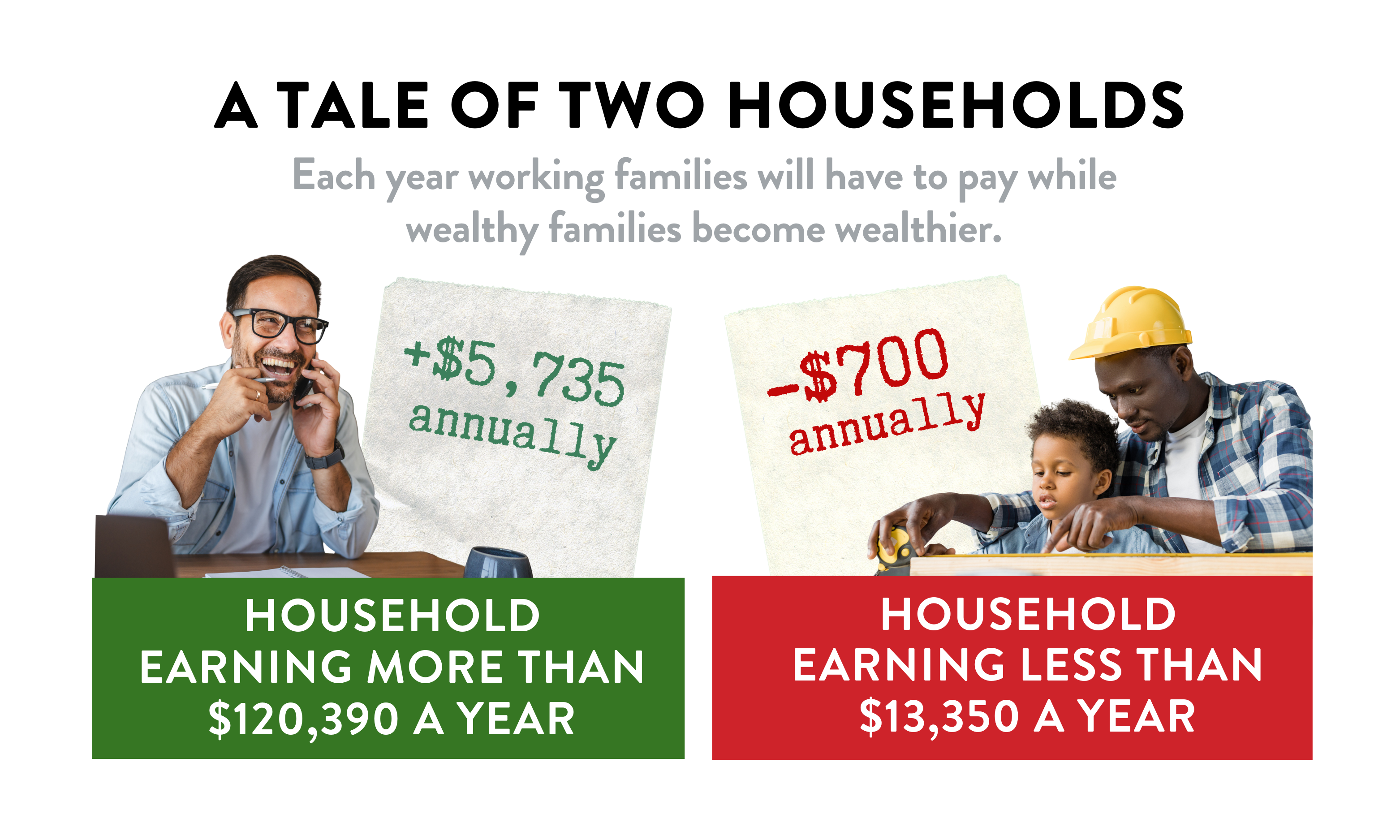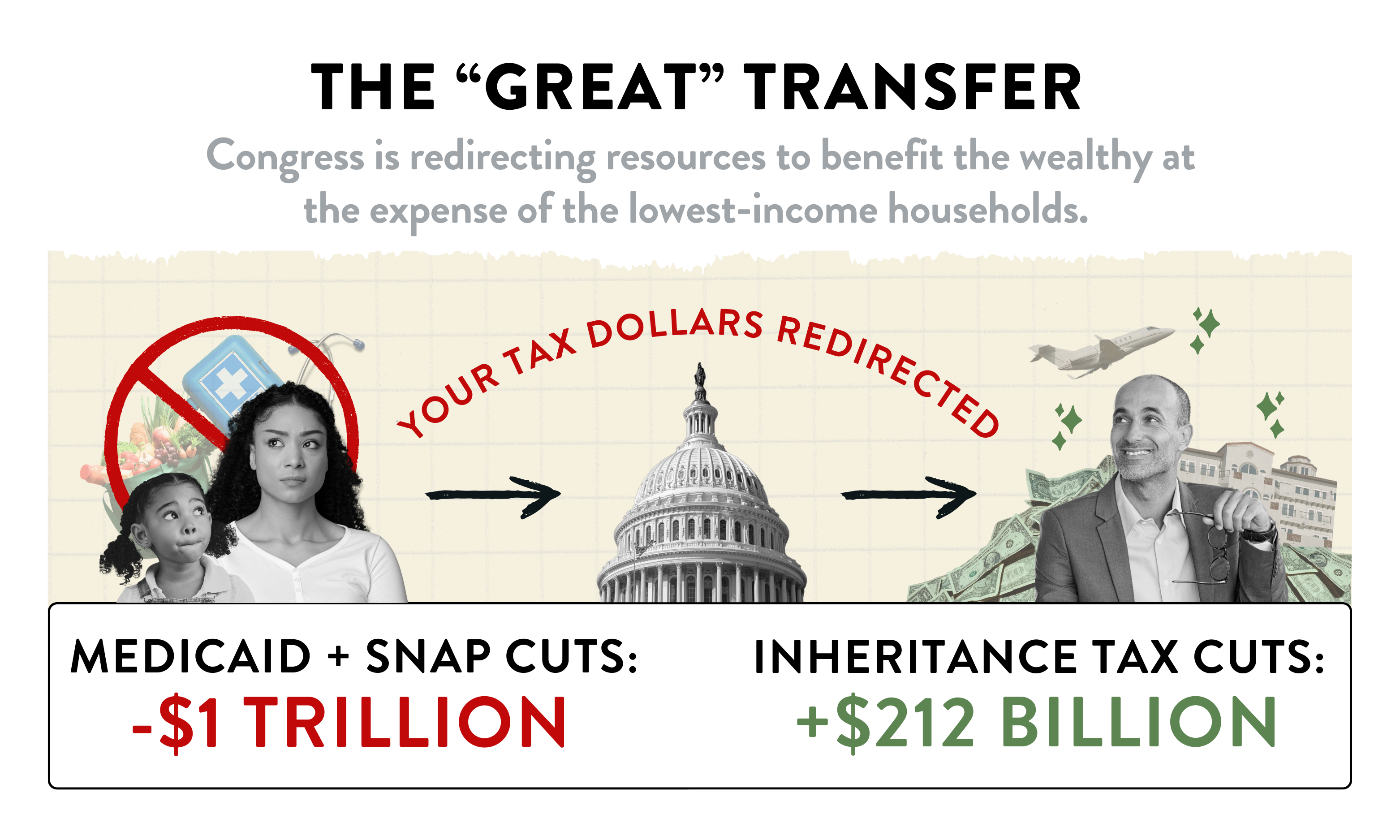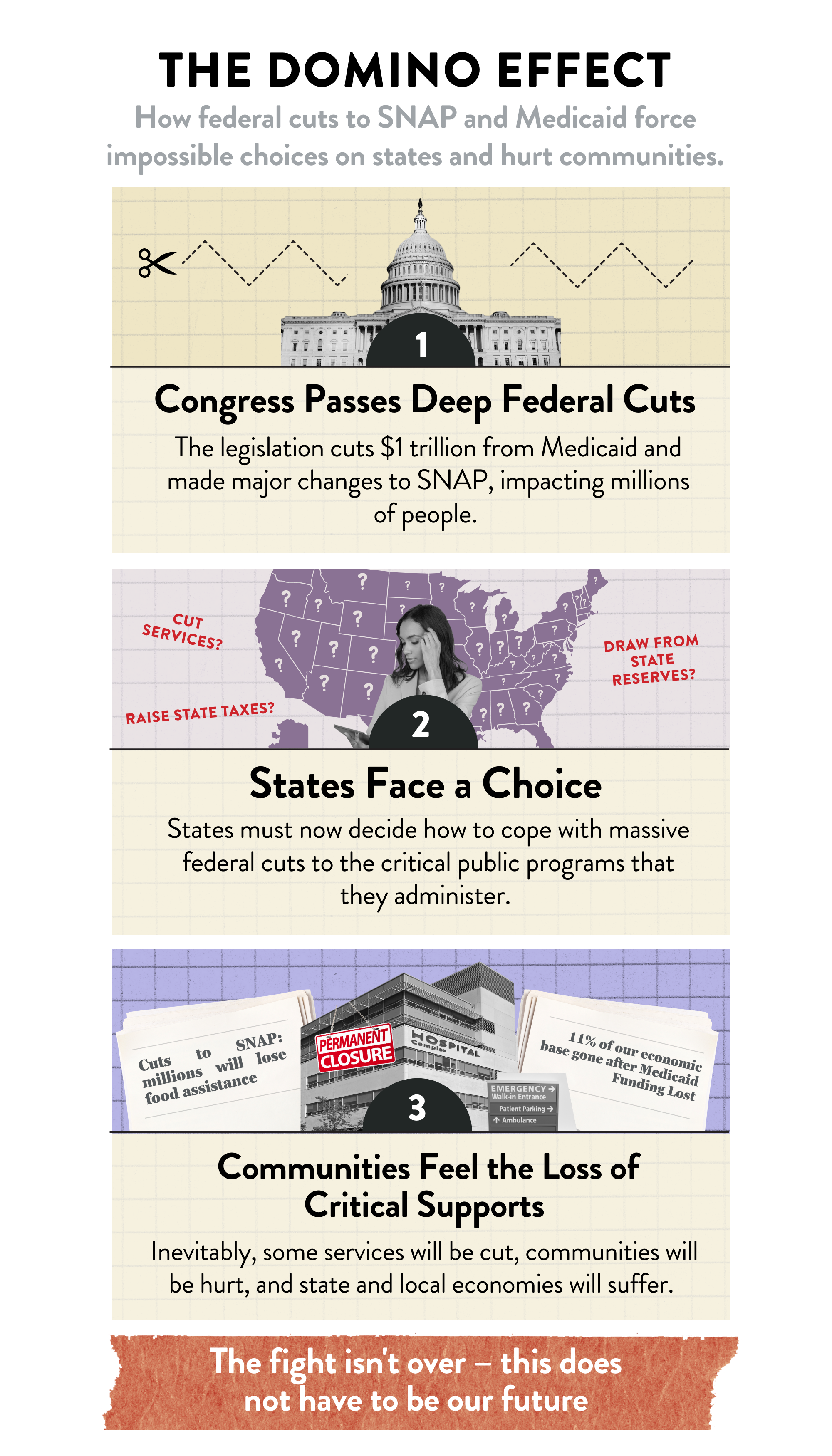
The Reconciliation Bill Is a Brazen Betrayal of Present and Future Generations
Instead of spending trillions to widen disparities, Congress could have made childcare more affordable, improved the nation’s crumbling housing stock, and created a much-overdue program for paid family and medical leave.

The passage of the inaptly named “One Big Beautiful Bill” is a loss for the country, not just because of immediate cost and economic harm it will cause families but because of the future we’re giving up. Slashing funding for programs that support individual and community well-being in order to cut taxes for the wealthy elite will most directly and immediately harm households with the fewest resources, but ultimately, everyone will lose out on a better future.
Congress could have invested in public goods that would sustain a more equitable economy, but they instead chose to cut taxes for the wealthy and corporations. Congress could have paid for infrastructure that would make our country more resilient, but they instead chose to slash funding for critical programs that support human needs. While congressional conservatives claimed that this legislation was about cutting costs and simplifying the tax code, it did the opposite. The tax provisions of this massively expensive legislation will cost $4.5 trillion over the next 10 years and give over $1 trillion in tax cuts to the nation’s wealthiest households.
This legislation, which is a brazen betrayal of workers and families, will increase economic disparity, slash social infrastructure, and hand over major tax benefits to wealthy households and corporations. Instead of spending trillions to widen disparities, Congress could have made childcare more affordable, improved the nation’s crumbling housing stock, and created a much-overdue program for paid family and medical leave. The economic harm of this legislation will be far-reaching, and states will have to scramble to try to make up for the budget gaps that it will cause.
Here are the impacts of the Reconciliation Bill:
Widened income disparity, and economic harm for working families
As a direct result of this legislation, lower-income households will see their resources decrease while high-income households will see their resources increase. This increased disparity will happen because the tax cuts give huge financial benefit to the already wealthy while the cuts to Medicaid and the Supplemental Nutrition Assistance Program will primarily harm people with lower incomes.
An analysis of the bill from the Yale Budget Lab shows that it will take money out of the pockets of the lowest-income households. Households who bring in less than $13,350 per year will see their after-tax income decrease by 2.9%. That’s about $700 per household, enough for six months of diapers. In contrast, those earning more than $120,390 per year will see their incomes increase by $5,735.
Cuts to social infrastructure programs and income supports
The legislation cuts $1 trillion from Medicaid, which is roughly the same as the amount spent on tax cuts for those earning over $650,000 per year. As a direct result of the cuts to Medicaid, around 11 million people will lose their health coverage. An additional 4 million people, almost half of whom are Black or Latino, will lose the ability to afford their health coverage because of Congress’ refusal to renew the ACA premium tax credit enhancement. This credit, which reduces health insurance costs for qualifying households who buy their coverage through the Health Insurance Marketplace, led to a spike in health insurance enrollment between 2021 and 2024, particularly among Black and Latino people.
In addition to the radical cuts to Medicaid, this legislation also makes major changes to the Supplemental Nutrition Assistance Program (SNAP), which will either reduce or entirely eliminate food assistance for millions of families. An analysis from the Urban Institute found that 22.3 million families will lose some or all of their SNAP benefits. The Congressional Budget Office, which is responsible for estimating and reporting on the impact of policy changes, estimated that the more stringent work requirements for SNAP would mean that 3.2 million people would lose their SNAP benefits. The result is 15 percent of families will have less food on their tables. Another specific provision in the new law will limit SNAP eligibility to U.S. citizens and those with lawful permanent residence status, ending food assistance for about 250,000 immigrants with other forms of legal status.
While the legislation does increase the maximum credit amount for the Child Tax Credit (CTC) from $2,000 to $2,200 per child, it restricts eligibility for that credit so that fewer children will receive it. The program now requires that the person filing for the CTC must have a Social Security number. This means that more than 2 million U.S. citizen children will not receive support from the CTC because they do not have a U.S. citizen parent. Congress also failed to correct a design feature of the CTC that excludes 17 million children from receiving the full amount of the “refundable” credit because their parents earn too little money. Because of racial disparities in income, this disproportionately harms Black and brown children: In 2021, three-quarters of white children were eligible for the full CTC, compared with only half of Black and Hispanic children.
A major windfall for corporations and the nation’s wealthiest households
The vast majority of the benefits from this legislation will go to wealthy households and corporations. The richest 1%, including CEOs, surgeons, and law firm partners earning more than $649,005 per year, will see their incomes increase by about 2%, or $29,585 per year. That means that the size of their gain is more than the total annual income of many households in the United States. Almost 20% of U.S. households bring in less than $30,000 a year.
The bill also increased the amount that ultra wealthy individuals can pass on to their heirs without paying taxes, from $13.99 million per individual to $15 million (or $30 million for a married couple). This tax giveaway to fewer than 1 percent of the nation’s wealthiest families will cost the country about $212 billion, more than the $186 billion that Congress cut from the Supplemental Nutrition Assistance Program. This policy change will widen the racial wealth divide: A recent study from the Institute on Taxation and Economic Policy found that 92 percent of wealth owned by families with $30 million or more in net worth is owned by white households.
Large and profitable corporations will also benefit enormously from this bill, reflecting the increasingly unchecked influence that corporations have in policymaking. One of largest and most expensive business giveaways is a permanent extension of what is known as the “Qualified Business Income deduction,” or the “pass-through deduction.” This deduction allows owners of certain types of businesses, including sole proprietors and partnership or S corporation owners (like consultants) to deduct up to 20 percent of their business income when calculating their individual income taxes.
This provision will cost the country $737 billion over 10 years and will continue to benefit primarily wealthy, white households. In 2023, 90 percent of the benefit of this deduction went to white households. In 2019, 64 percent of the benefits went to households with incomes over $410,000. An analysis from ProPublica found that, in the first years that this law was in effect, just 82 of the country’s wealthiest households (including billionaire owners of megacompanies) collectively cut $1 billion from their tax bills as a direct result of the pass-through deduction.
In addition to redistributing resources across households, the legislation redistributes resources across businesses. A tax credit once reserved for clean-energy projects now goes to companies that produce metallurgical coal. A special carveout allows oil and gas drillers to drastically reduce or even eliminate their tax bills. This takes away tax credits for wind and solar. It gives $45 billion directly to private prison companies, money that will go directly to private prisons to expand their capacity to detain immigrants.
Congress could have made a different choice
A slim majority of congressional conservatives passed a bill that extends major tax cuts for wealthy households and corporations while leaving working- and middle-class families to foot the bill. But they could have made a different choice. They could have made the tax code more equitable by cutting taxes for lower-income households and imposing a fairer tax rate on the ultra rich and on profitable corporations. They could have chosen to spend the revenue raised from that fairer tax code to pay for things like free childcare; more high-quality, permanently affordable housing; and lifesaving climate-resilient upgrades to our infrastructure. But Congress added $4.1 trillion to the national deficit to pay for inequitable tax cuts. Here’s what they could have paid for instead:
- Make child care infrastructure affordable and accessible – $400 billion: It would cost about $400 billion over 10 years to fund a child care program that would expand universal pre-kindergarten to all 3- and 4-year-olds, build out the supply of child care, and raise wages for early childhood educators. In an industry where women of color make up a disproportionate share of the workforce, an investment in living wages would be a step toward mitigating the legacy of systemic sexism and racism in our economy.
- Upgrade and improve public housing conditions – $234 billion: The federal government has underfunded public housing for decades, leading to a steady and dangerous decline in housing conditions for residents, an issue that has disproportionately harmed households of color. A program like what was outlined in the Green New Deal for Public Housing Act of 2024 would have cost only $234 billion over 10 years, improving living conditions for over 2 million families and making housing infrastructure more climate resilient and energy efficient. It would have created around 280,000 union jobs and preserved essential affordable housing for the next generations.
- Create a national comprehensive paid family leave program – $547 billion: The United States is one of the only countries in the world without a national paid family leave program. Only 27 percent of the American workforce has access to paid family leave through their employers. A program like the one outlined in the FAMILY Act would give workers, regardless of the size of their company, 12 weeks of partial income while taking leave for their own health or to care for a family member. A 2020 estimate from the Congressional Budget Office showed that such a program would cost about $547 billion over 10 years.
The price tag of these three programs together is $1.3 trillion. With the $4.1 trillion added to the deficit, Congress could have done each of these things and still had $2.8 trillion left to invest in communities and working families.
A setback for state and local economies
This legislation will cause direct harm to our state and local economies. We can expect that such enormous cuts to Medicaid will have economic ramifications far beyond the millions of people who will lose their coverage. According to a new working paper from the Washington Center for Equitable Growth, Medicaid is an essential element of regional economies, accounting for about 11.2 percent of the economic base. As the paper notes, this is more than the auto industry’s contribution to Detroit or chemical manufacturing’s contribution to Houston.
Another major feature of this legislation is that it slashes federal funding for programs that states administer. For example, the federal government has historically fully funded SNAP benefits, while the states cover about half of the cost to administer the programs. The law now requires states to pay for a portion of SNAP benefits for the residents of their states. This means that states will have to dip into their own budgets, many of which are already stretched thin, to fill what will be an enormous funding gap. States will have to either raise taxes or redirect funds from other public services to prevent their constituents from losing critical support.
This imminent state-level budget crisis will undoubtedly cause disproportionate economic harm to households with the lowest incomes. This will be especially true in states that have recently cut taxes and will face even larger budget gaps.
Conclusion
The harm from this new law will be far-reaching. Not only will millions of people lose access to their health care and critical income supports, but our economy will suffer as more and more people struggle to make ends meet. The tax policies that this bill passed into law will lead to further entrenchment of income and wealth inequality and a widening of the racial wealth divide. The disinvestment in public goods and services like schools, income support programs, and climate-resilient infrastructure and environmental protections sets our country back generations.
The passage of this bill into law represents a major challenge in the fight for a more equitable economy and democracy in which all people can thrive, but the fight continues. Advocates and organizers across the country know deeply what polling has shown for months: This law and its priorities are extremely unpopular with the people. In the wake of the passage of this bill, we must remain committed to harnessing people power to fight for more-progressive taxation on the federal and state level and public investments that get us closer to a more just, inclusive, multiracial economy and democracy.







